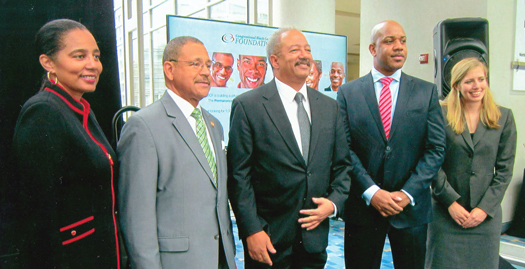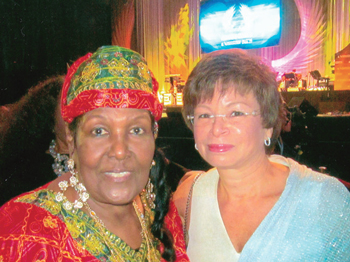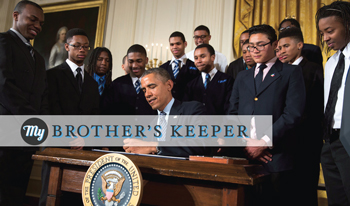My Brother’s Keeper focus of Black Caucus conference
By Starla Muhammad and Nisa Islam Muhammad -Final Call Staffers- | Last updated: Oct 7, 2014 - 11:38:03 AMWhat's your opinion on this article?

From Left: Shuanise Washington, president and CEO of the CBC Foundation; Rep. Sanford D. Bishop, Jr., Honorary Co-Chair of the CBC; Charles “Chaka” Fattah, chairman of the CBC Foundation and other attendees participate in the 2014 Black Legislative Conference 44th anniversary.
|
WASHINGTON - My Brother’s Keeper, the initiative introduced by President Barack Obama earlier this year, was a major focus of what was a full schedule of activities and events during the 2014 Congressional Black Caucus Foundation Annual Legislative Conference weekend in the nation’s capital. This year marked the 44th year of the event.
“Too many young men of color feel targeted by law enforcement, guilty of walking while Black, or driving while Black, judged by stereotypes that fuel fear and resentment and hopelessness. We know that, statistically, in everything from enforcing drug policy to applying the death penalty to pulling people over, there are significant racial disparities,” said President Obama at the CBC Awards Dinner Sept. 27.
“That’s just the statistics. One recent poll showed that the majority of Americans think the criminal justice system doesn’t treat people of all races equally. Think about that. That’s not just Blacks, not just Latinos or Asians or Native Americans saying things may not be unfair. That’s most Americans,” said the president.

Ms. Valarie Jarrett Senior advisor to President Obama and Claudette Marie Muhammad.
|
Mr. Obama’s remarks at the dinner reiterated his concern for the unique challenges facing Black men and boys which matched the CBC’s concerns reflected in workshops and town hall meetings during the Sept. 24-27 weekend.
Mr. Obama also spoke on the newly rolled out My Brother’s Keeper Community Challenge, to encourage tribal leaders, mayors, county executives and others to “implement coherent cradle-to-college-and-career strategies aimed at improving life outcomes for all young people.”
“It’s a challenge to local leaders to follow the evidence and use the resources on what works for our kids. And we’ve already got 100 mayors, county officials, tribal leaders, Democrats, Republicans signed on,” said Mr. Obama.
The initiative was the focus of a standing room only town hall meeting during the legislative weekend that featured Rev. Al Sharpton of the National Action Network and MSNBC. He moderated one of the several panels that looked at the challenges of being a Black male in America.
“We’ve got to be real with our young people,” said former NBA star Etan Thomas, a panelist. “Society is gunning for them. They don’t know how unjust and unfair it is and we have to make sure that we tell them.”
The responsibility on who is going to do exactly that belongs to the Black community and specifically, successful Black men who are in a position to do more to help others, said Rev. Sharpton.
“My Brother’s Keeper,” he explained is about believing in young men. “That’s why it doesn’t matter to me what it costs or what we do. I’m going to always fight for the Michael Browns or the Eric Garners, not because I’m in civil rights but because Michael Brown was me. Eric Garner was me,” added Rev. Sharpton, invoking the names of two in a long line of young, Black men killed at the hands of police.

|
The president’s initiative has not been without its critics. Phil Jackson of the Chicago-based Black Star Project told The Final Call he very much wants the initiative to succeed and work because it is needed. But he is concerned grassroots organizations that mentor, work with and support Black boys and young men and have done so for years with little or no support and funding, will be cut out of the loop.
So the latest “language” in the Community Challenge that refers to “all children” concerns him. All children do not need this kind of help, Black and Latino males need it, Mr. Jackson said. His organization works with all children but its focus is on young Black people.
“We need to be intentional about the language we use. The only way we’re going to get intentional results is if we are intentional about what we’re trying to do,” he added. Mr. Jackson said he is also still terribly disappointed about where the money to fund and support programs under My Brother’s Keeper is going.
“The people who’ve been doing this work for the past 25, 30, 35 years, they’ve been cut out of the funding link. They’re not even being considered for funding and that’s extremely disappointing to me. It’s unconscionable,” said Mr. Jackson.
According to White House.gov, in June $194 million was announced from philanthropic organizations to expand initiatives along with $20 million in total commitments from UBS America and JPMorgan Chase & Co. Tens of millions of more dollars have been promised and pledged.
Mr. Jackson said no grassroots organizations he knows of have received any of the funds to date.
The CBC Legislative conference also included a variety of workshops that analyzed issues affecting life in Black America. Mothers of Murdered Children featured Valerie Bell, mother of Sean Bell; Michael Brown, Sr. and Lesley McSpadden parents of Michael Brown; Gwen Garner, mother of Eric Garner and Sybrina Fulton mother of Trayvon Martin. Featured topics also included the voting rights act, money, wealth and disparities, Afro-Latino partnerships and the need for more Black male teachers.
Melanie L. Campbell of the National Coalition on Black Civic Participation and president and convener of the Black Women’s Roundtable attended the conference. She was glad to see such a variety of sessions dealing with criminal justice and economic issues facing the Black community in addition to upcoming elections and voting rights. Ms. Campbell has attended several Black Caucus legislative conferences since the mid-1990s. She called the CBC conference the “brain trust” for Black people.
“That’s where you get the opportunity for folks to come together in one setting meeting on issues that have been identified as being critical for our community,” Ms. Campbell told The Final Call. Her group hosted their Black Women’s roundtable the day before the start of the conference. The CBC gathering gives community-based groups the opportunity to host events during the four day conference, she added.
With the polarization that has consumed Washington the past few years there is a need for voices that understand the Black community which is why the CBC and the Congressional Black Caucus Foundation are still relevant and important today, said Ms. Campbell, who worked in city government with the late Maynard Jackson, the first Black mayor of Atlanta. The work must continue, she said.
As November 2014 mid-term congressional elections approach, members of the CBC are partnering with 3,000 Black churches to encourage higher Black voter turnout as part of its “Freedom Sundays” campaign launched Sept. 21. Strategies include encouraging churches to hold events, conduct press conferences and use social media to highlight the legacy of Freedom Summer and discuss what is at stake for Black America in the 2014 elections, according to the CBC Toolkit for Freedom Sunday.
Formed in 1971, the CBC represents Black members of Congress and currently has 43 members listed on its website. The CBC Foundation is a nonprofit organization dedicated to research and policy issues affecting the Black community. Its annual legislative conference brings together Black politicians, analysts and activists.
INSIDE STORIES AND REVIEWS
-
-
About Harriett ... and the Negro Hollywood Road Show
By Rabiah Muhammad, Guest Columnist » Full Story -
Skepticism greets Jay-Z, NFL talk of inspiring change
By Bryan 18X Crawford and Richard B. Muhammad The Final Call Newspaper @TheFinalCall » Full Story -
The painful problem of Black girls and suicide
By Charlene Muhammad -National Correspondent- » Full Story -
Exploitation of Innocence - Report: Perceptions, policies hurting Black girls
By Charlene Muhammad -National Correspondent- » Full Story -
Big Ballin: Big ideas fuel a father’s Big Baller Brand and brash business sense
By Bryan Crawford -Contributing Writer- » Full Story






 Click Here Stay Connected!
Click Here Stay Connected!








